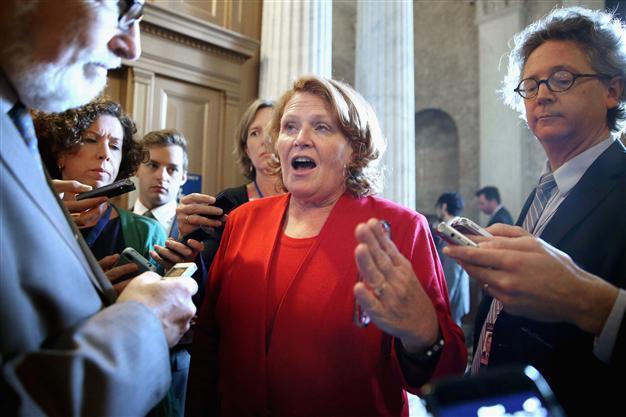U.S. Congress victory moves Obama's Pacific trade pact forward
WASHINGTON - Reuters

Sen. Heidi Heitkamp (D-ND) (C) talks with reporters following the weekly Democratic Senate policy luncheon at the U.S. Capitol June 23, 2015 in Washington, DC. The Senate passed an important procedural vote on the Trans Pacific Partnership bill, which would grant President Barack Obama enhanced negotiating powers to complete a major trade accord, clearing the way for final passage as early as Wednesday. AFP Photo
U.S. lawmakers approved legislation key to securing a hallmark Pacific trade deal by a comfortable margin on June 24, advancing President Barack Obama's efforts to strengthen U.S. economic ties with Asia.
After a six-week congressional battle including two brushes with failure, some fancy legislative footwork and myriad backroom deals to keep the legislation alive, the Senate voted 60 to 38 to grant Obama the power to negotiate trade deals and send them on a fast track through Congress. The bill next goes to Obama for his signature.
Final passage could push the 12-nation Trans-Pacific Partnership (TPP), a central part of Obama's foreign policy pivot to Asia, over the finish line and also boost hopes that an ambitious trade deal with the European Union could soon be completed.
The Senate also passed a separate bill providing aid to workers who lose their jobs because of trade.
The TPP, potentially a legacy-defining achievement for Obama, would be the biggest free trade agreement in a generation and rank with China's ascension to the world trade stage and the North American Free Trade Agreement liberalizing trade between the United States, Canada and Mexico.
But TPP ministers still have tricky issues to resolve, ranging from monopoly periods for next-generation medicines to the treatment of state-owned enterprises.
Some member countries, including Japan and Canada, want to have fast-track in place before making final offers on the trade deal, which would cover 40 percent of the world economy and raise annual global economic output by nearly $300 billion.
Negotiators say a deal on the TPP could be wrapped up within weeks once countries are sure Congress will not pick the deal apart, which fast-track prevents.
"We are optimistic that (fast-track) will lead the way for many new market-opening agreements, including the Trans-Pacific Partnership," said Caterpillar Inc Chief Executive Doug Oberhelman.
Worker aid bill Senators showed slightly less support than in an initial vote a month ago for fast-track, which would let lawmakers set negotiating goals for trade deals but restrict them to yes-or-no votes on final agreements.
Fast-track authority lasts for up to six years and would extend to any trade deals negotiated by Obama's successor, who would take office in January 2017.
The vote came as Congress was trying to finish up the four parts of the trade legislation package and send them to Obama: fast-track negotiating authority, aid for workers who lose their jobs as a result of trade, an Africa trade preferences bill and a customs enforcement measure.
Fast-track was forced back to the Senate floor after a revolt by Democrats in the House of Representatives resulted in it being split from a companion worker aid measure.
That bill received unanimous approval and now returns to the House, where many Democrats who previously opposed the aid program now plan to support it. Their initial opposition was part of a ploy that failed to derail fast-track legislation.
The top Democrat on the House Ways and Means Committee, Sander Levin, said he expects the "vast majority" of Democrats to vote "yes." That would allow both measures to go to Obama for approval this week, before lawmakers go on a week-long break.
The bruising congressional battle has pitted Obama against many in his own party, including House Democratic leader Nancy Pelosi, and prompted blood-letting among Republicans after party leaders lashed out at conservatives who refused to back the trade agenda.
Opinion polls show a majority of Americans support trade in general, but congressional approval has been a slog because labor unions and activists have campaigned against fast-track, warning of job losses and vowing to retaliate against Democrats who break ranks to support trade.
The front runner for the party's presidential nomination in 2016, Hillary Clinton, said Democratic critics had legitimate concerns but has so far reserved judgment on the TPP.
